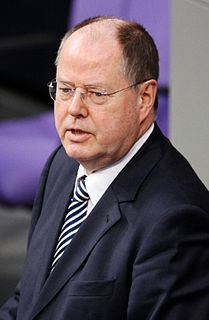A Quote by Charles Kennedy
'Federalism', in the context of political and media usage in Britain, has come to mean the creation and imposition of a European superstate, one centralised in Brussels.
Related Quotes
For the institutions of the European Union are at present incomplete. A European Senate is badly needed to complete them. By creating an upper chamber in the European parliament, a new bridge could be built between national political classes, which retain democratic legitimacy, and the decision-making process in Brussels. Such a Senate should be recruited by indirect election from exisiting national parliaments.
This is crossing the Rubicon, after which there will be no more sovereign states in Europe with fully-fledged governments and parliaments which represent legitimate interests of their citizens, but only one State will remain. Basic things will be decided by a remote 'federal government' in Brussels and, for example, Czech citizens will be only a tiny particle whose voice and influence will be almost zero. ... We are against a European superstate.
In referendums in 2005, the Dutch and the French electorates rejected the European Constitution, which aimed to turn the E.U. into a genuine state. But Brussels refused to take no for an answer. It went ahead with its plans for a constitutional treaty, notwithstanding the people's opposition. Brussels thinks it knows better than the people.
With calm, knowledgeable precision, Daniel Ziblatt wades into the adjacent swamps of federalism and nineteenth-century European history, emerging with hands full of gems. Beneath the tangle of great statesmen and national culture he discovers conflicting regional political interests, sharp regional variations in political capacity, fearful defenses against excessive democracy, coercive conquest of weak states, and unintended consequences galore. Read, think, and learn.
I use throughout the term 'liberal' in the original, nineteenth-century sense in which it is still current in Britain. In current American usage it often means very nearly the opposite of this. It has been part of the camouflage of leftish movements in this country, helped by muddleheadedness of many who really believe in liberty, that 'liberal' has come to mean the advocacy of almost every kind of government control.


































